中考第一轮复习人教新目标八年级英语上册Unit 4-Unit6 词汇短语复习课件
文档属性
| 名称 | 中考第一轮复习人教新目标八年级英语上册Unit 4-Unit6 词汇短语复习课件 |  | |
| 格式 | pptx | ||
| 文件大小 | 201.9KB | ||
| 资源类型 | 试卷 | ||
| 版本资源 | 人教新目标(Go for it)版 | ||
| 科目 | 英语 | ||
| 更新时间 | 2025-02-15 17:56:27 | ||
图片预览

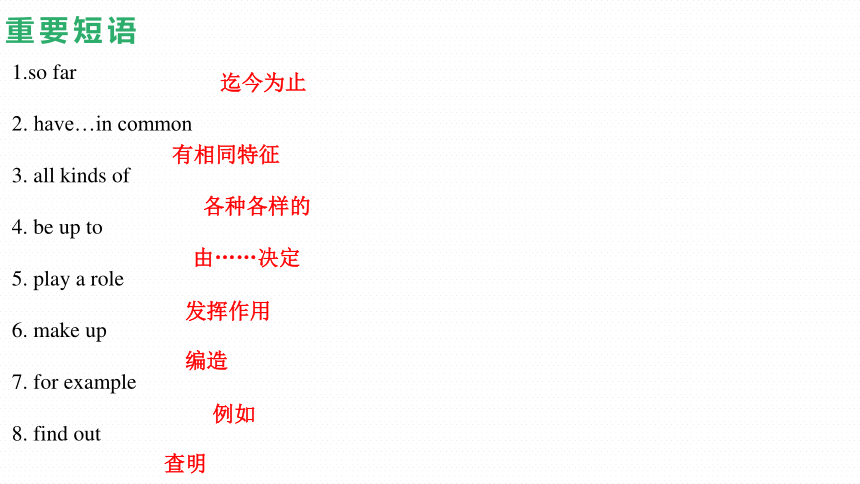
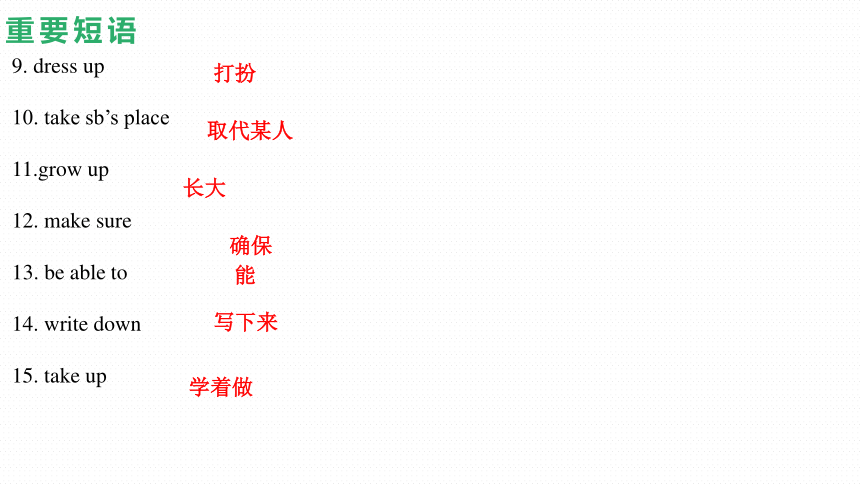




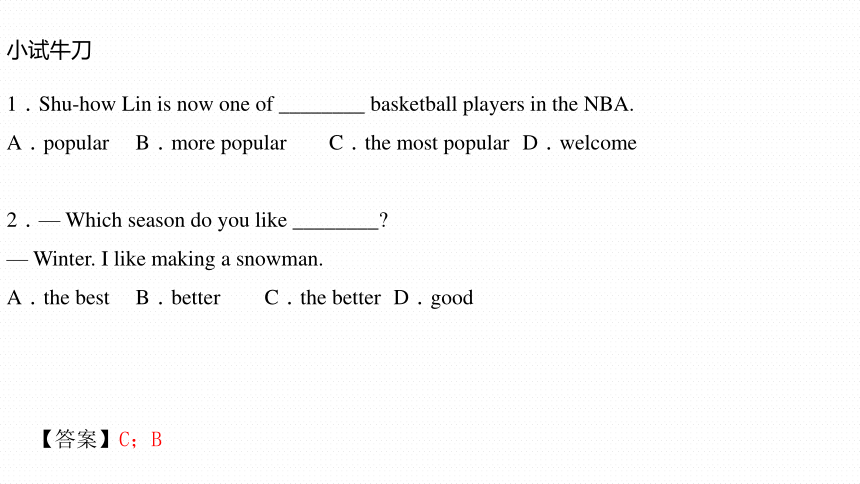
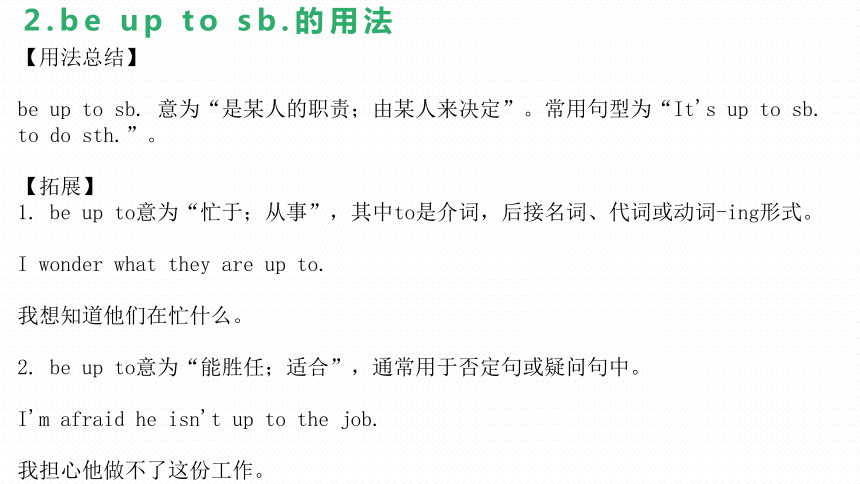
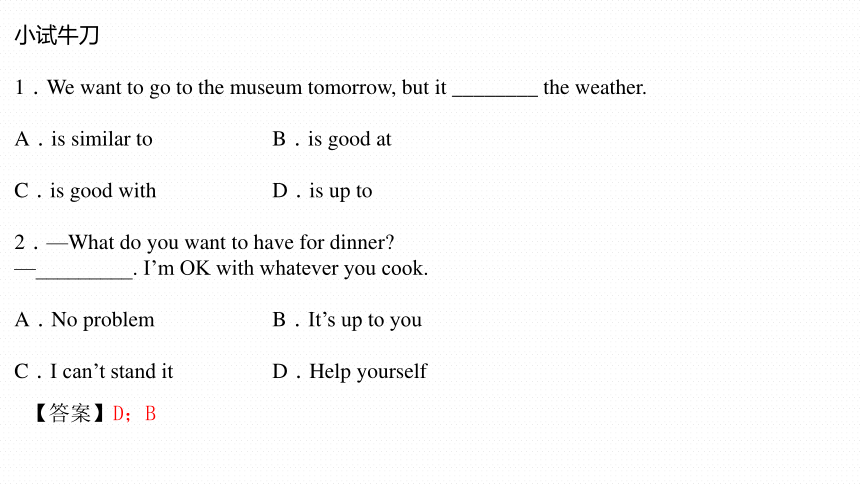


文档简介
(共37张PPT)
Unit 4-6词汇短语复习
八
最新人教版
上
单元总复习
/ 让教学更有效 高效备考| 英语学科
1.so far
2. have…in common
3. all kinds of
4. be up to
5. play a role
6. make up
7. for example
8. find out
重要短语
迄今为止
有相同特征
各种各样的
例如
编造
由……决定
发挥作用
查明
9. dress up
10. take sb’s place
11.grow up
12. make sure
13. be able to
14. write down
15. take up
重要短语
打扮
长大
能
取代某人
确保
写下来
学着做
1. What’s the best…to go to
2. Which is the worst…in town
3. What do you think of…
4. What do you plan to do
5. What do you want to be when you grow up
6. How are you going to do that
重要句型
Unit 4-6
语法汇集
八年级
最新人教版
上
/ 让教学更有效 高效备考| 英语学科
1.最高级
1. 最高级用于比较三个或三个以上的人或物,其结构形式为“主语+be+the+形容词最高级十名词+表示范围的短语或从句”或“主语+实义动词(+the)+副词最高级+表示范围的短语或从句”。
She is the best student in her class. 她是她班上最好的学生。
This is the biggest apple I have ever seen. 这是我见过的最大的苹果。
She jumps(the)farthest in her class. 她是她班里跳得最远的。
2. 表示……是……最……. 的……之一”用“主语+be+one of the+形容词最高级+复数名词+表示范围的短语或从句”。
Shanghai is one of the biggest cities in China上海是中国最大的城市之一。
3. 最高级和比较级之间的转化:“主语+be+the+形容词最高级+名词+表示范围的短语或从句”表示“……是……中最……的”,等于“主语+be+形容词比较级+than+any other+名词”,表示“……比任何其他的……都……”。
Russia is the biggest country in the world. =Russia is bigger than any other country in the world. 俄罗斯是世界上最大的国家。
小试牛刀
1.Shu-how Lin is now one of ________ basketball players in the NBA.
A.popular B.more popular C.the most popular D.welcome
2.— Which season do you like ________
— Winter. I like making a snowman.
A.the best B.better C.the better D.good
【答案】C;B
2.be up to sb.的用法
【用法总结】
be up to sb. 意为“是某人的职责;由某人来决定”。常用句型为“It's up to sb. to do sth.”。
【拓展】
1. be up to意为“忙于;从事”,其中to是介词,后接名词、代词或动词-ing形式。
I wonder what they are up to.
我想知道他们在忙什么。
2. be up to意为“能胜任;适合”,通常用于否定句或疑问句中。
I'm afraid he isn't up to the job.
我担心他做不了这份工作。
小试牛刀
1.We want to go to the museum tomorrow, but it ________ the weather.
A.is similar to B.is good at
C.is good with D.is up to
2.—What do you want to have for dinner
—_________. I’m OK with whatever you cook.
A.No problem B.It’s up to you
C.I can’t stand it D.Help yourself
【答案】D;B
so far意为“到目前为止;迄今为止”,相当于by now,指从过去某一时刻开始到现在的这一段时间,常与现在完成时连用。
You haven't answered my question so far.
到现在你还没回答我的问题。
温馨提示
常用于现在完成时的时间状语还有recently,in the past few years,this month等。
3.so far的用法
【答案】C;C
1.So far, the number of people using 5G mobile phones ________ a lot.
A.is increasing B.have increased C.has increased
2.We ________ four quizzes and five tests so far this semester.
A.are having B.have C.have had D.had
1. hope作“希望”讲,主要用来表示主观上的愿望并对其实现抱有信心,可接不定式(短语)或that引导的从句,但不可接“宾语十不定式”。
We are hoping to see the president who will come to China.
我们希望见到将要来中国的那位总统。
I hope that you can tell us the truth.
我希望你能告诉我们真相。
2. wish作“但愿,希望”讲,表示某种未完成或不能完成的愿望,可接不定式(短语)、双宾语、“宾语+不定式”的复合结构以及that从句。
I wish you to go to Beijing with me next year.
我希望你明年与我一起去北京。
4.hope/wish/expect
We wish you success/(to be)happy.
我们祝愿你成功/快乐。
Everyone wishes(that)he could pass the English exam.
每个人都希望他能通过英语考试。
I wish(that)I were a millionaire.
我希望自己是百万富翁。
【注意】
表示实现愿望的可能性不大或根本不可能实现时,从句用虚拟语气。
3. expect作“期待,期望”讲,侧重于相信或认为有实现可能的愿望,可接名词、不定式(短语)、不定式的复合结构等。
I never expected his coming/help.
我从未期望他来/帮忙。
We expect to hear from Jane.
我们期待收到简的信。
I expect you to give me a hand.
我期望你帮我一把。
He expected that he could get there on time.
他期望他能按时到达那儿。
【答案】B;C
1.—What do you expect ________ from clubs
—I hope to make more friends who have a lot in common.
A.get B.to get C.getting D.got
2.We expect ________ the sitcom, but Tom says we should try ________ the sports show.
A.to watch; watching B.watching; to watch C.to watch; to watch D.watching; watching
【用法总结】
辨析 be going to/will
be going to与will两者都可表示将要发生的事、将要去做某事,但它们有以下几点区别:
1. be going to表示近期、眼下就要发生的事情,will表示将来要发生的事情。
He is going to write a letter tonight. 今晚他将写一封信。
He will write a book one day. 将来某一天,他会写一本书。
2. be going to 表示根据主观判断将来肯定会发生的事情,will表示客观上将来势必发生的事情。
He is seriously ill. He is going to die. 他病得严重,他要死了。
He will be twenty years old. 他将要二十岁了。
5.be going to/will
【用法总结】
3. be going to含有“计划,准备”的意思,而will没有这个意思。
She is going to lend us her book. 她计划将她的书借给我们。
He will be here in half an hour. 他半小时后到这儿。
4. 在含有条件状语从句的主从复合句中,主句一般不用be going to,而多用will。
If any beast comes at you, I'll stay with you and help you.
如果有野兽袭击你,我会与你在一起,帮助你。
5. 表示意图、提议、许诺、自愿做某事或坚持做某事时用will。
—Who will post this letter for me 谁会给我寄信 —I will. 我会。
练一练:
1.There ________ a football match next week. Let’s go and watch it.
A.will have B.will be C.have D.is going to have
2.—What are you going to learn in your English class next week
—We ________ Unit 4.
A.learn B.learned
C.are learning D.are going to learn
【答案】B;D
【用法总结】
1. other表示泛指,意为“另外的,别的,其他的”。注意下面other的几种变形:
(1)others: other的复数形式,表示泛指,意为“别的人或物”,但不指全部。
Many students are playing on the playground. Some are playing football; others are playing basketball.
许多学生在操场上玩耍。一些在踢足球,其他人在打篮球。
(2)the other:表示两者中的另外一个,可单独使用,也可接单数名词。
The old man has two sons. One is a worker, and the other is a teacher.
这位老人有两个儿子。一个是工人,另一个是教师。
6.other/another
温馨提示
如果the other后接复数名词或者用其复数形式(the others),则都表示其余的全部。
We shall do some cleaning this afternoon. Group One will clean the walls. Group Two will clean the windows. The other students will sweep the floor. 今天下午我们将做打扫工作。一组清理墙壁。二组清理窗户。其余的学生扫地。
2. another常用于指三者或三者以上中的“另外一个”。它可单独使用,也可后接名词。如果其后接复数名词,则表示“又,再,还”。
This cap is too small for me. Show me another(one).
这顶帽子对我来说太小了。给我拿另一顶。
We need another three assistants in our shop.
我们店里还需要三个助理。
练一练:
2.This sweater is too big for me, please give me ________ one.
A.other B.the other C.others D.another
3.They asked him to leave—________ he was fired.
A.in other word B.in another word C.in other words D.in another words
【答案】D;C
辨析 happen/take place
7.happen和take place的用法
happen “发生”,常用于偶然或突发性事件,主语常为事,而不是人,常用结构:
(1)sth. happens to sb. 某人发生某事
(2)sth. happens+地点/时间状语某地/某时发生某事
“碰巧”,主语通常是人,常用结构:sb. happens to do sth. 某人碰巧做某事
take place “发生;举行;举办”,一般指非偶然性事件的“发生”,即这种事件的发生一定有某种原因或经过事先的安排
练一练
1.—What will take place if computers can do all the jobs for human beings
—Nobody knows.
A.happen B.come out C.appear
2.—Last night, I called you, but your mother said you were in hospital. What ________ you
—Take it easy. I just had a cold.
A.take place to B.happens C.happened to D.happening
【答案】A ;C
【用法总结】
1. be sure确信
Are you sure 你确定吗
be sure to do sth. 务必做某事
be sure of/about(doing)sth. 对……有把握
be sure+that从句确信……
2. make sure弄明白,查明白
make sure of/make sure about/make sure+that从句
3. sure常用来回答一般疑问句,意为“当然;的确”,相当于yes 或certainly;sure在英式英语中较为常用,而在美式英语中常用certainly。
—Are you going with us 你和我们一起去吗
—Sure. 当然了。
8.sure的用法
练一练:
1.Are you sure ________ Mr. Li will come to your birthday party
A.that B.if C.when D.how
2.—If you join the Lions, you’ll be a great soccer player.
—________
A.I’m sure I will. B.Shall I travel C.What you say! It’s fun.
【答案】A;A
【用法总结】
9.Promise的用法
1. promise vt. 保证,许诺。有三种结构:
(1)promise to do sth. 许诺/答应做某事
My mother promised to buy a piano for me. 我妈妈许诺给我买一架钢琴。
(2)promise sb. sth. 许诺某人某物
My aunt promised me a bike. 我姑妈许诺给我一辆自行车。
(3)promise +that从句许诺……
Tom promises that he can return on time. 汤姆许诺他能按时回来。
2. promise n. 允诺,诺言
make promises/a promise to sb. 向某人许诺
1.Please promise ________ late ________ the show. Otherwise, our son will be rather disappointed (失望的).
A.not be; for B.not be; to C.not to be; for D.not to be; to
2.I won’t leave unless he _________ me.
A.promised to help B.will promise help C.promises helping D.promises to help
【答案】C;D
【用法总结】
10.不定式的用法
动词不定式的基本构成是“to + 动词原形”, to 后接的动词没有人称和数的变化。 它保留着动词的特点, 可以有自己的宾语和状语. 动词不定式具有名词、形容词和副词的特征, 在句中可以作除谓语之外的其他成分。
1. 动词不定式的用法
(1) 一些动词(短语) 后常跟不定式作宾语, 常见的这类动词 (短语) 是表示打算或希望。如: would like, want, wish, hope, decide, plan, expect 等
例 I would like to see a film this evening. 我今晚想看电影。
(2) 有些动词后面用不定式作宾语补足语时要省去 to。这样的动词可归纳为:一感 (feel), 二听 (hear, listen to),三让 (let, make, have), 四看 (see, watch, look at, notice). 当它们用于被动结构时, to 必须保留 (let 除外)。
→ They were made to go out of the classroom by the teacher.
(3) 如果作宾语的不定式有宾语补足语时, 常用 it 作形式宾语, 而将真正的实语后置。
例 I find it not easy to lean to ride a bike. 我发现学骑自行车不太容易。
(4) 在 but, except等表示“除了……”之意的介词前, 若有动词do的某种形式,介词后作宾语的不定式常省略 to。
例 He does everything except go to school. 他怎么也不去上学。
2. 常见省略 to 的不定式结构
had better do sth. 最好做某事 would rather do sth. 宁愿做某事
cannot but do sth. 只好做某事 do nothing but do sth. 只好做某事
Why not do sth. 为什么 (不) 做某事
1.—Let’s ________ volleyball.
—That ________ good.
A.play; sounds B.to play; sounds C.play; is sound D.to play; is
2.They are trying ________ what is going on around the world.
A.find out B.to find out C.look for D.to look for
【答案】A;B
Unit 4-6
基础练习
八年级
最新人教版
上
/ 让教学更有效 高效备考| 英语学科
1.We are glad to hear that the Greens to a new apartment soon.
A.is moving B.is going to move C.will move D.both B & C
2.Young people today like to watch TV with _______advertisements.
A.less B.least C.fewer D.fewest
3.—What do you do with these apples, Mum
—The biggest one belongs to your brother and the rest are yours.
A.beautiful ones B.heavy ones C.others
4.—________ you ________ a letter from your brother so far
—Yes, I ________ a letter from him yesterday.
A.Have; got; got B.Have; got; have got
C.Did; get; got D.Did; have got; got
5.—I don’t know how to improve my English writing. Could you give me some advice
—________ find a pen friend and write to him every week I’m sure it works.
A.Why not B.Why don’t C.What about D.Why not to
一、单项选择
答案:CCCAA
二、根据对话内容,从选项中选出能填入空白处的最佳选项,其中有两个为多余选项。
A: Hello, Tony! Guess where I am now! I’m in Hohhot! People here are kind. 1
B: You must be very excited.
A: 2
B: Why
A: Because I know little about their customs.
B: Don’t worry. I can help you.
A: That’s great! 3
B: Of course. And when you meet them, remember to say hello first. When entering a yurt (蒙古包), don’t step on the threshold (门槛).
A: OK. Anything else
B: When you enter the yurt, you will be offered some food. Don’t refuse it, even if you’re not hungry. 4
B: You’re welcome. 5
A.Yes, you must get there on time.B.Or you’ll be considered impolite.
C.Yeah, but I’m a little nervous, too.D.Hope you enjoy yourself tomorrow.
E.I don’t know what gift I will give her.
F.Am I supposed to prepare a gift before going there
G.A local family just invited me to have dinner at their yurt tomorrow.
答案:CCCAA
三、阅读理解
When you want to ask your teacher a question during class, what do you do Do you simply shout out your question as soon as it enters your mind Or do you raise your hand and wait until the teacher calls your name
If you politely raise your hand first, it’s probably because your teacher requires what you are allowed to do when you have a question. Can you imagine what it would be like if everyone can talk whenever they want during class Instead of a peaceful learning environment, a class without rules would be chaotic (乱的)!
When you learn to drive, you will realize how many rules you have to follow. The rules for driving share a common purpose (目的) with many rules you must follow in your daily life to keep your safe. As an ancient Chinese saying goes, “No rules, no standards.” If you make a list of the rules you follow each day, you will quickly realize how many of them can keep you safe and make your life more enjoyable as a result.
Although sometimes you feel like a rule is unfair, don’t break it. Instead, decide what you can do to change the rule. Working within the rules to change the rules is what you need to do.
1. What does the writer start the passage
A.By giving examples.B.By describing a situation.C.By asking some questions.
2. To keep order in the class, what can teachers do according to paragraph 2
A.Change some rules.B.Teach students how important the rules are.
C.Make some rules in advance.
3. What does the underlined sentence mean in Chinese
A.不以规矩,不能成方圆。 B.有则改之,无则加勉。 C.吃一堑,长一智。
4. What can we learn from the passage
A.We need to pay attention to unfair rules.
B.We can’t make an effort to change the rules.
C.Follow the rules can give you a safe and happy life in a way.
5. What is the passage mainly about ________.
A.The ways of making fair rules
B.The importance of rules
C.The rules can influence our lives
【答案】1.C 2.C 3.A 4.C 5.B
Thank you!
Unit 4-6词汇短语复习
八
最新人教版
上
单元总复习
/ 让教学更有效 高效备考| 英语学科
1.so far
2. have…in common
3. all kinds of
4. be up to
5. play a role
6. make up
7. for example
8. find out
重要短语
迄今为止
有相同特征
各种各样的
例如
编造
由……决定
发挥作用
查明
9. dress up
10. take sb’s place
11.grow up
12. make sure
13. be able to
14. write down
15. take up
重要短语
打扮
长大
能
取代某人
确保
写下来
学着做
1. What’s the best…to go to
2. Which is the worst…in town
3. What do you think of…
4. What do you plan to do
5. What do you want to be when you grow up
6. How are you going to do that
重要句型
Unit 4-6
语法汇集
八年级
最新人教版
上
/ 让教学更有效 高效备考| 英语学科
1.最高级
1. 最高级用于比较三个或三个以上的人或物,其结构形式为“主语+be+the+形容词最高级十名词+表示范围的短语或从句”或“主语+实义动词(+the)+副词最高级+表示范围的短语或从句”。
She is the best student in her class. 她是她班上最好的学生。
This is the biggest apple I have ever seen. 这是我见过的最大的苹果。
She jumps(the)farthest in her class. 她是她班里跳得最远的。
2. 表示……是……最……. 的……之一”用“主语+be+one of the+形容词最高级+复数名词+表示范围的短语或从句”。
Shanghai is one of the biggest cities in China上海是中国最大的城市之一。
3. 最高级和比较级之间的转化:“主语+be+the+形容词最高级+名词+表示范围的短语或从句”表示“……是……中最……的”,等于“主语+be+形容词比较级+than+any other+名词”,表示“……比任何其他的……都……”。
Russia is the biggest country in the world. =Russia is bigger than any other country in the world. 俄罗斯是世界上最大的国家。
小试牛刀
1.Shu-how Lin is now one of ________ basketball players in the NBA.
A.popular B.more popular C.the most popular D.welcome
2.— Which season do you like ________
— Winter. I like making a snowman.
A.the best B.better C.the better D.good
【答案】C;B
2.be up to sb.的用法
【用法总结】
be up to sb. 意为“是某人的职责;由某人来决定”。常用句型为“It's up to sb. to do sth.”。
【拓展】
1. be up to意为“忙于;从事”,其中to是介词,后接名词、代词或动词-ing形式。
I wonder what they are up to.
我想知道他们在忙什么。
2. be up to意为“能胜任;适合”,通常用于否定句或疑问句中。
I'm afraid he isn't up to the job.
我担心他做不了这份工作。
小试牛刀
1.We want to go to the museum tomorrow, but it ________ the weather.
A.is similar to B.is good at
C.is good with D.is up to
2.—What do you want to have for dinner
—_________. I’m OK with whatever you cook.
A.No problem B.It’s up to you
C.I can’t stand it D.Help yourself
【答案】D;B
so far意为“到目前为止;迄今为止”,相当于by now,指从过去某一时刻开始到现在的这一段时间,常与现在完成时连用。
You haven't answered my question so far.
到现在你还没回答我的问题。
温馨提示
常用于现在完成时的时间状语还有recently,in the past few years,this month等。
3.so far的用法
【答案】C;C
1.So far, the number of people using 5G mobile phones ________ a lot.
A.is increasing B.have increased C.has increased
2.We ________ four quizzes and five tests so far this semester.
A.are having B.have C.have had D.had
1. hope作“希望”讲,主要用来表示主观上的愿望并对其实现抱有信心,可接不定式(短语)或that引导的从句,但不可接“宾语十不定式”。
We are hoping to see the president who will come to China.
我们希望见到将要来中国的那位总统。
I hope that you can tell us the truth.
我希望你能告诉我们真相。
2. wish作“但愿,希望”讲,表示某种未完成或不能完成的愿望,可接不定式(短语)、双宾语、“宾语+不定式”的复合结构以及that从句。
I wish you to go to Beijing with me next year.
我希望你明年与我一起去北京。
4.hope/wish/expect
We wish you success/(to be)happy.
我们祝愿你成功/快乐。
Everyone wishes(that)he could pass the English exam.
每个人都希望他能通过英语考试。
I wish(that)I were a millionaire.
我希望自己是百万富翁。
【注意】
表示实现愿望的可能性不大或根本不可能实现时,从句用虚拟语气。
3. expect作“期待,期望”讲,侧重于相信或认为有实现可能的愿望,可接名词、不定式(短语)、不定式的复合结构等。
I never expected his coming/help.
我从未期望他来/帮忙。
We expect to hear from Jane.
我们期待收到简的信。
I expect you to give me a hand.
我期望你帮我一把。
He expected that he could get there on time.
他期望他能按时到达那儿。
【答案】B;C
1.—What do you expect ________ from clubs
—I hope to make more friends who have a lot in common.
A.get B.to get C.getting D.got
2.We expect ________ the sitcom, but Tom says we should try ________ the sports show.
A.to watch; watching B.watching; to watch C.to watch; to watch D.watching; watching
【用法总结】
辨析 be going to/will
be going to与will两者都可表示将要发生的事、将要去做某事,但它们有以下几点区别:
1. be going to表示近期、眼下就要发生的事情,will表示将来要发生的事情。
He is going to write a letter tonight. 今晚他将写一封信。
He will write a book one day. 将来某一天,他会写一本书。
2. be going to 表示根据主观判断将来肯定会发生的事情,will表示客观上将来势必发生的事情。
He is seriously ill. He is going to die. 他病得严重,他要死了。
He will be twenty years old. 他将要二十岁了。
5.be going to/will
【用法总结】
3. be going to含有“计划,准备”的意思,而will没有这个意思。
She is going to lend us her book. 她计划将她的书借给我们。
He will be here in half an hour. 他半小时后到这儿。
4. 在含有条件状语从句的主从复合句中,主句一般不用be going to,而多用will。
If any beast comes at you, I'll stay with you and help you.
如果有野兽袭击你,我会与你在一起,帮助你。
5. 表示意图、提议、许诺、自愿做某事或坚持做某事时用will。
—Who will post this letter for me 谁会给我寄信 —I will. 我会。
练一练:
1.There ________ a football match next week. Let’s go and watch it.
A.will have B.will be C.have D.is going to have
2.—What are you going to learn in your English class next week
—We ________ Unit 4.
A.learn B.learned
C.are learning D.are going to learn
【答案】B;D
【用法总结】
1. other表示泛指,意为“另外的,别的,其他的”。注意下面other的几种变形:
(1)others: other的复数形式,表示泛指,意为“别的人或物”,但不指全部。
Many students are playing on the playground. Some are playing football; others are playing basketball.
许多学生在操场上玩耍。一些在踢足球,其他人在打篮球。
(2)the other:表示两者中的另外一个,可单独使用,也可接单数名词。
The old man has two sons. One is a worker, and the other is a teacher.
这位老人有两个儿子。一个是工人,另一个是教师。
6.other/another
温馨提示
如果the other后接复数名词或者用其复数形式(the others),则都表示其余的全部。
We shall do some cleaning this afternoon. Group One will clean the walls. Group Two will clean the windows. The other students will sweep the floor. 今天下午我们将做打扫工作。一组清理墙壁。二组清理窗户。其余的学生扫地。
2. another常用于指三者或三者以上中的“另外一个”。它可单独使用,也可后接名词。如果其后接复数名词,则表示“又,再,还”。
This cap is too small for me. Show me another(one).
这顶帽子对我来说太小了。给我拿另一顶。
We need another three assistants in our shop.
我们店里还需要三个助理。
练一练:
2.This sweater is too big for me, please give me ________ one.
A.other B.the other C.others D.another
3.They asked him to leave—________ he was fired.
A.in other word B.in another word C.in other words D.in another words
【答案】D;C
辨析 happen/take place
7.happen和take place的用法
happen “发生”,常用于偶然或突发性事件,主语常为事,而不是人,常用结构:
(1)sth. happens to sb. 某人发生某事
(2)sth. happens+地点/时间状语某地/某时发生某事
“碰巧”,主语通常是人,常用结构:sb. happens to do sth. 某人碰巧做某事
take place “发生;举行;举办”,一般指非偶然性事件的“发生”,即这种事件的发生一定有某种原因或经过事先的安排
练一练
1.—What will take place if computers can do all the jobs for human beings
—Nobody knows.
A.happen B.come out C.appear
2.—Last night, I called you, but your mother said you were in hospital. What ________ you
—Take it easy. I just had a cold.
A.take place to B.happens C.happened to D.happening
【答案】A ;C
【用法总结】
1. be sure确信
Are you sure 你确定吗
be sure to do sth. 务必做某事
be sure of/about(doing)sth. 对……有把握
be sure+that从句确信……
2. make sure弄明白,查明白
make sure of/make sure about/make sure+that从句
3. sure常用来回答一般疑问句,意为“当然;的确”,相当于yes 或certainly;sure在英式英语中较为常用,而在美式英语中常用certainly。
—Are you going with us 你和我们一起去吗
—Sure. 当然了。
8.sure的用法
练一练:
1.Are you sure ________ Mr. Li will come to your birthday party
A.that B.if C.when D.how
2.—If you join the Lions, you’ll be a great soccer player.
—________
A.I’m sure I will. B.Shall I travel C.What you say! It’s fun.
【答案】A;A
【用法总结】
9.Promise的用法
1. promise vt. 保证,许诺。有三种结构:
(1)promise to do sth. 许诺/答应做某事
My mother promised to buy a piano for me. 我妈妈许诺给我买一架钢琴。
(2)promise sb. sth. 许诺某人某物
My aunt promised me a bike. 我姑妈许诺给我一辆自行车。
(3)promise +that从句许诺……
Tom promises that he can return on time. 汤姆许诺他能按时回来。
2. promise n. 允诺,诺言
make promises/a promise to sb. 向某人许诺
1.Please promise ________ late ________ the show. Otherwise, our son will be rather disappointed (失望的).
A.not be; for B.not be; to C.not to be; for D.not to be; to
2.I won’t leave unless he _________ me.
A.promised to help B.will promise help C.promises helping D.promises to help
【答案】C;D
【用法总结】
10.不定式的用法
动词不定式的基本构成是“to + 动词原形”, to 后接的动词没有人称和数的变化。 它保留着动词的特点, 可以有自己的宾语和状语. 动词不定式具有名词、形容词和副词的特征, 在句中可以作除谓语之外的其他成分。
1. 动词不定式的用法
(1) 一些动词(短语) 后常跟不定式作宾语, 常见的这类动词 (短语) 是表示打算或希望。如: would like, want, wish, hope, decide, plan, expect 等
例 I would like to see a film this evening. 我今晚想看电影。
(2) 有些动词后面用不定式作宾语补足语时要省去 to。这样的动词可归纳为:一感 (feel), 二听 (hear, listen to),三让 (let, make, have), 四看 (see, watch, look at, notice). 当它们用于被动结构时, to 必须保留 (let 除外)。
→ They were made to go out of the classroom by the teacher.
(3) 如果作宾语的不定式有宾语补足语时, 常用 it 作形式宾语, 而将真正的实语后置。
例 I find it not easy to lean to ride a bike. 我发现学骑自行车不太容易。
(4) 在 but, except等表示“除了……”之意的介词前, 若有动词do的某种形式,介词后作宾语的不定式常省略 to。
例 He does everything except go to school. 他怎么也不去上学。
2. 常见省略 to 的不定式结构
had better do sth. 最好做某事 would rather do sth. 宁愿做某事
cannot but do sth. 只好做某事 do nothing but do sth. 只好做某事
Why not do sth. 为什么 (不) 做某事
1.—Let’s ________ volleyball.
—That ________ good.
A.play; sounds B.to play; sounds C.play; is sound D.to play; is
2.They are trying ________ what is going on around the world.
A.find out B.to find out C.look for D.to look for
【答案】A;B
Unit 4-6
基础练习
八年级
最新人教版
上
/ 让教学更有效 高效备考| 英语学科
1.We are glad to hear that the Greens to a new apartment soon.
A.is moving B.is going to move C.will move D.both B & C
2.Young people today like to watch TV with _______advertisements.
A.less B.least C.fewer D.fewest
3.—What do you do with these apples, Mum
—The biggest one belongs to your brother and the rest are yours.
A.beautiful ones B.heavy ones C.others
4.—________ you ________ a letter from your brother so far
—Yes, I ________ a letter from him yesterday.
A.Have; got; got B.Have; got; have got
C.Did; get; got D.Did; have got; got
5.—I don’t know how to improve my English writing. Could you give me some advice
—________ find a pen friend and write to him every week I’m sure it works.
A.Why not B.Why don’t C.What about D.Why not to
一、单项选择
答案:CCCAA
二、根据对话内容,从选项中选出能填入空白处的最佳选项,其中有两个为多余选项。
A: Hello, Tony! Guess where I am now! I’m in Hohhot! People here are kind. 1
B: You must be very excited.
A: 2
B: Why
A: Because I know little about their customs.
B: Don’t worry. I can help you.
A: That’s great! 3
B: Of course. And when you meet them, remember to say hello first. When entering a yurt (蒙古包), don’t step on the threshold (门槛).
A: OK. Anything else
B: When you enter the yurt, you will be offered some food. Don’t refuse it, even if you’re not hungry. 4
B: You’re welcome. 5
A.Yes, you must get there on time.B.Or you’ll be considered impolite.
C.Yeah, but I’m a little nervous, too.D.Hope you enjoy yourself tomorrow.
E.I don’t know what gift I will give her.
F.Am I supposed to prepare a gift before going there
G.A local family just invited me to have dinner at their yurt tomorrow.
答案:CCCAA
三、阅读理解
When you want to ask your teacher a question during class, what do you do Do you simply shout out your question as soon as it enters your mind Or do you raise your hand and wait until the teacher calls your name
If you politely raise your hand first, it’s probably because your teacher requires what you are allowed to do when you have a question. Can you imagine what it would be like if everyone can talk whenever they want during class Instead of a peaceful learning environment, a class without rules would be chaotic (乱的)!
When you learn to drive, you will realize how many rules you have to follow. The rules for driving share a common purpose (目的) with many rules you must follow in your daily life to keep your safe. As an ancient Chinese saying goes, “No rules, no standards.” If you make a list of the rules you follow each day, you will quickly realize how many of them can keep you safe and make your life more enjoyable as a result.
Although sometimes you feel like a rule is unfair, don’t break it. Instead, decide what you can do to change the rule. Working within the rules to change the rules is what you need to do.
1. What does the writer start the passage
A.By giving examples.B.By describing a situation.C.By asking some questions.
2. To keep order in the class, what can teachers do according to paragraph 2
A.Change some rules.B.Teach students how important the rules are.
C.Make some rules in advance.
3. What does the underlined sentence mean in Chinese
A.不以规矩,不能成方圆。 B.有则改之,无则加勉。 C.吃一堑,长一智。
4. What can we learn from the passage
A.We need to pay attention to unfair rules.
B.We can’t make an effort to change the rules.
C.Follow the rules can give you a safe and happy life in a way.
5. What is the passage mainly about ________.
A.The ways of making fair rules
B.The importance of rules
C.The rules can influence our lives
【答案】1.C 2.C 3.A 4.C 5.B
Thank you!
